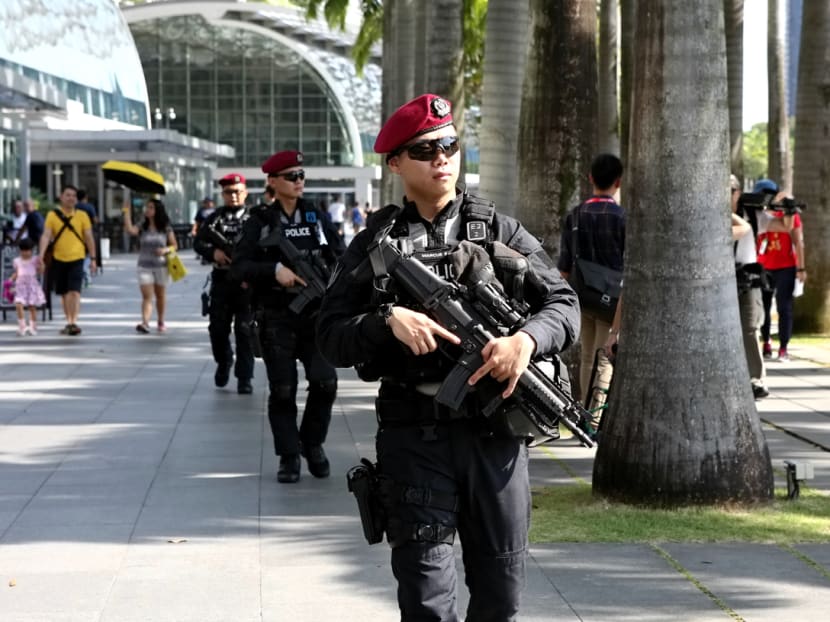New sentencing framework set out to protect police officers
SINGAPORE — Those who behave violently against police officers carrying out their duties can expect to face tougher punishment, according to a new sentencing framework set out by the High Court.

Special Operations Command (SOC) police officers patrolling around the vicinity of The Float @ Marina Bay. TODAY file photo
SINGAPORE — Those who behave violently against police officers carrying out their duties can expect to face tougher punishment, according to a new sentencing framework set out by the High Court.
The framework will comprise three broad sentencing bands that range from a fine or a jail term of up to a year, to imprisonment of between three and seven years, depending on the severity of the offence.
Three High Court judges set out the framework after upping the jail sentence from one week to 10 weeks for a man who had slapped a policeman in April last year.
The prosecutors had appealed the jail sentence given to the man, Jeffrey Yeo Ek Boon, calling it “manifestly inadequate”. The High Court allowed the appeal and increased Yeo’s jail term in September.
“Police officers … frequently endanger their lives and risk their personal safety in the discharge of their duties to protect society by maintaining law and order,” Judge of Appeal Tay Yong Kwang wrote in explaining the rationale behind the new framework, which was issued as part of the written judgement against Yeo released on Wednesday (Nov 29).
“While one could argue that danger is inherent in the work of the police on the ground, surely those who preserve law and order and protect society dutifully deserve to feel assured that they will be protected adequately by the law that they uphold.”
Punishment for an offender under the new framework would correspond to the extent and nature of injuries sustained by the police officer, as well as the manner and motivation of the suspect.
The first band, for instance, corresponds with cases where minor injuries are involved and the pain is momentary. An offender in this category may be fined, or jailed for up to a year.
“The majority of cases that have been prosecuted thus far fall into this category,” Justice Tay noted.
Offenders would only get away with a fine in “very exceptional” cases, such as when young offenders or those with mental disorders are involved, the judges added.
Cases that fall within the second band would include situations where the police officer suffered minor injuries from a suspect who was motivated to cause harm, or when the officer suffered serious injuries but the suspect’s culpability was low.
Jail sentences in this middle band would range from one to three years.
The third category, involving very serious and long-term injuries to a police officer, would see the offender face a jail term of between three and seven years, the maximum imprisonment sentence for those who cause hurt to deter a public servant from his duties.
“Such offences are generally intended to strike at the very heart of the police as an institution of law and order,” Justice Tay wrote.
In the case of Yeo, who had slapped a policeman after a night out drinking, the judges said his offences would fall into the lower end of the first category.
Police officers found the 26-year-old sprawled out on a grass patch near a canal along Bukit Timah Road on April 16, 2016. He became aggressive after the officers woke him.
Yeo muttered expletives, and then slapped one of the officers.
Commenting on the sentence given by the lower courts, the High Court judges agreed that it fell “far below the normal sentencing range”, despite the mitigating circumstances.
The new framework, Justice Tay wrote, must “reflect society’s opprobrium of such offences”.
In September, Home Affairs Minister K Shanmugam flagged the rising trend of Home Team uniformed officers being physically or verbally abused. There were 484 cases — or more than one a day — last year.
Mr Shanmugam, who is also the Law Minister, pointed out that the problem had worsened, with the number of such cases rising more than 65 per cent between 2014 and last year.









